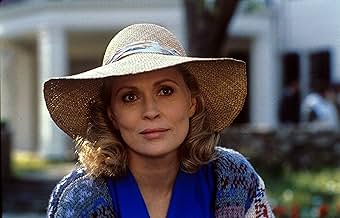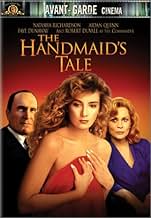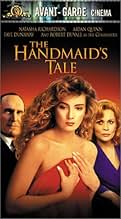Num mundo de tiranía religiosa, uma jovem mulher é escravisada sexualmente por sua fertilidade.Num mundo de tiranía religiosa, uma jovem mulher é escravisada sexualmente por sua fertilidade.Num mundo de tiranía religiosa, uma jovem mulher é escravisada sexualmente por sua fertilidade.
- Direção
- Roteiristas
- Artistas
- Prêmios
- 2 vitórias e 1 indicação no total
Reiner Schöne
- Luke
- (as Rainer Schoene)
Robert D. Raiford
- Dick
- (as Robert Raiford)
- Direção
- Roteiristas
- Elenco e equipe completos
- Produção, bilheteria e muito mais no IMDbPro
Avaliações em destaque
I finally watched this after watching the TV show and if anything, it shows that some books should not be adapted unless there is enough time to tell the story.
The film tries to feature the key moments that the TV show had time to bring up, and 90 minutes (or so) simply isn't enough.
The casting is flawed on several characters, like many reviewers point at, and the script feels rushed, which of course creates the feeling that the story progresses without any logic.
Nonetheless you will find some scenes are really good, and in fact, those same scenes found their way into the TV show.
The atmosphere of the book is well conveyed, I just wish they had had more time, which the largely superior TV show had.
Watch this for reference after reading the book, after watching the show : great books can make awesome TV shows but poor films sometimes.
The film tries to feature the key moments that the TV show had time to bring up, and 90 minutes (or so) simply isn't enough.
The casting is flawed on several characters, like many reviewers point at, and the script feels rushed, which of course creates the feeling that the story progresses without any logic.
Nonetheless you will find some scenes are really good, and in fact, those same scenes found their way into the TV show.
The atmosphere of the book is well conveyed, I just wish they had had more time, which the largely superior TV show had.
Watch this for reference after reading the book, after watching the show : great books can make awesome TV shows but poor films sometimes.
This is a nightmare vision of the future. It seems 1 out of every 100 women is fertile (for some reason). The ones who aren't perform slave labor. The ones that are are "sold" off to rich families where they have sex with the husband to produce a baby. Kate (the late and missed Natasha Richardson) is one such servant to Serena Joy (Faye Dunaway) and her husband the Commander (Robert Duvall). Kate wants out--but it seems there's no way.
The synopsis only scratches the surface of a VERY dark and disturbing movie. It slowly shows how women are treated and used and it just gets more horrifying as it unfolds. The parallels to Hitler's Nazi Germany are fairly obvious but here we have barren women instead of Jews and gays. The good acting by everybody makes this hard to shake off. Aidan Quinn (as Nick) and Duvall are OK; Victoria Tennant is chilling as a leader of the camps; Elizabeth McGovern is just great as a fellow prisoner who befriends Kate; Dunaway is also very good in her role. Best of all is Richardson. This couldn't have been an easy role but she pulls it off beautifully. She died at far too young an age. This is basically an unknown movie and it's easy to see why--it's far too dark and disturbing for a general audience. However the ending is (sort of) uplifting (and changed from the book). Grim, dark and depressing. View it at your own risk. The ceremony sequences are almost impossible to watch and shocked the hell out of me the first time I saw this.
The synopsis only scratches the surface of a VERY dark and disturbing movie. It slowly shows how women are treated and used and it just gets more horrifying as it unfolds. The parallels to Hitler's Nazi Germany are fairly obvious but here we have barren women instead of Jews and gays. The good acting by everybody makes this hard to shake off. Aidan Quinn (as Nick) and Duvall are OK; Victoria Tennant is chilling as a leader of the camps; Elizabeth McGovern is just great as a fellow prisoner who befriends Kate; Dunaway is also very good in her role. Best of all is Richardson. This couldn't have been an easy role but she pulls it off beautifully. She died at far too young an age. This is basically an unknown movie and it's easy to see why--it's far too dark and disturbing for a general audience. However the ending is (sort of) uplifting (and changed from the book). Grim, dark and depressing. View it at your own risk. The ceremony sequences are almost impossible to watch and shocked the hell out of me the first time I saw this.
There's nothing subtle about this screen adaptation of Margaret Atwood's cautionary fable, but the premise is nothing if not provocative: in a repressive fundamentalist dictatorship (called Gilead, but ostensibly America in the near future) the few remaining fertile women are forced to bear children, in effect becoming sexual servants to the (male) powers-that-be. Gilead may be colored red, white and blue, but there's more than a passing resemblance to Orwell's Oceana; even the act of conception is reduced to a ritual, with the euphemism 'ceremony' doubling for intercourse. A talented cast does its best with Harold Pinter's typically inscrutable screenplay, but under Volker Schlondorff's dispassionate direction the film never achieves a convincing level of oppression or paranoia. Worse, it lacks a story to match its scenario; the handmaid Offred's redemption is achieved only with the help of another man, which seems to deflate the feminist slant. The final result is nowhere near a successful movie, but never less than a fascinating failure.
The handmaids in brilliant red, the wives in electric blue, the children in white--Margaret Atwood's neo-fascist state comes startingly alive in Schloendorff's film. The bright colors are oppressive in their uniformity, whether in the "ceremony"--Robert Duvall's passionless copulation with Natasha Richardson as she lies in the lap of his sterile wife, Faye Dunaway--or in the party to celebrate the birth of a handmaid's child, or the execution of another handmaid for fornication. There are several fine actors--Elizabeth McGovern and Aidan Quinn also play memorable, if brief, roles--but the cinematography steals the show here, giving this anti-Utopia the same oppressive tension as the original 1984 and far surpassing any version of Brave New World. It may be that Atwood's book, which I haven't read, adds layers of depth to the characters and plot, but Schloendorff's visualisation is a real enhancement to the tale. He creates the tension of a police state with only momentary intrusions of brutality or machinery. A strong film that will gain its following with time.
I'm surprised by some of the negative comments on this film. In my opinion, it represents the best kind of literary adaptation that the cinema offers: One in which the screenwriter and director clearly remained faithful to the spirit of the book without attempting to reproduce it. How can you go wrong with a Margaret Atwood book, a Harold Pinter screenplay and Volker Schlöndorff's direction? Some have suggested that the film suffered from "wooden" acting. Personally, I thought it was a fantastic cast: Robert Duvall and Victoria Tennant at their evil best; Faye Dunnaway as the "defeated" wife; Elizabeth McGovern as saucy as ever; Aidan Quinn and Natascha Richardson in the necessarily bland roles that drive the narrative. What holes here?
Commercial film doesn't get any better. "The Handmaid's Tale" is a dark portrait of a world unlike ours and yet so much like ours... in which a right-wing, bureaucratic patriarchy dominates the land. Women have three main functions (for which their clothing is color coded): Red for the handmaids, who are walking wombs; white for the innnocent children; blue for the sterile trophy wives. Brown is worn by the "aunts", a futuristic equivalent of the Sonderkomando (i.e., Jews who worked on behalf of the Nazi's in the death camps), evil schoolmistress types who both train/brainwash young women for assignment and occasionally destroy them. A fifth function, for which the garb is particularly interesting, is "working" in Gilead's underground social club (essentially a den of iniquity, rife with prostitution and drugs.) Point is... by splitting up these functions, hasn't Atwood described the basic roles that women play within our own male-dominated society, in various different permutations and combinations? To the patriarchy, women are mothers, models, sluts, angels and, when professionals, they are not to aspire to more teaching posts. In Gilead, the lines are clearer; in our own society, aren't most women "supposed to" play some combination of all of these roles?
I get the feeling that most moviegoers are looking for something else in "sci-fi." Here's a new plot twist: The rebels feed Kate some kind of medication that allows her to read the commander's mind while destroying his brain. Wait... that's "Scanners." Oops. Seriously, two of the reviews on this site made spedific mention of Schlöndorff's "horrible", "atrocious" directorial skills. Ahem. Perhaps before they weigh in on the auteur, they ought to see "Young Törless", "Coup de grâce", "The Tin Drum" and all of his other wonderful efforts. As a matter of fact, to insinuate that someone who could bring Grass' Tin Drum to the screen in such a stunning fashion is a lousy director is PREPOSTEROUS. Schlöndorff is a giant of the New German Cinema, and it underscores the ignorance of the Hollywooders when they cast such baseless aspersions.
Commercial film doesn't get any better. "The Handmaid's Tale" is a dark portrait of a world unlike ours and yet so much like ours... in which a right-wing, bureaucratic patriarchy dominates the land. Women have three main functions (for which their clothing is color coded): Red for the handmaids, who are walking wombs; white for the innnocent children; blue for the sterile trophy wives. Brown is worn by the "aunts", a futuristic equivalent of the Sonderkomando (i.e., Jews who worked on behalf of the Nazi's in the death camps), evil schoolmistress types who both train/brainwash young women for assignment and occasionally destroy them. A fifth function, for which the garb is particularly interesting, is "working" in Gilead's underground social club (essentially a den of iniquity, rife with prostitution and drugs.) Point is... by splitting up these functions, hasn't Atwood described the basic roles that women play within our own male-dominated society, in various different permutations and combinations? To the patriarchy, women are mothers, models, sluts, angels and, when professionals, they are not to aspire to more teaching posts. In Gilead, the lines are clearer; in our own society, aren't most women "supposed to" play some combination of all of these roles?
I get the feeling that most moviegoers are looking for something else in "sci-fi." Here's a new plot twist: The rebels feed Kate some kind of medication that allows her to read the commander's mind while destroying his brain. Wait... that's "Scanners." Oops. Seriously, two of the reviews on this site made spedific mention of Schlöndorff's "horrible", "atrocious" directorial skills. Ahem. Perhaps before they weigh in on the auteur, they ought to see "Young Törless", "Coup de grâce", "The Tin Drum" and all of his other wonderful efforts. As a matter of fact, to insinuate that someone who could bring Grass' Tin Drum to the screen in such a stunning fashion is a lousy director is PREPOSTEROUS. Schlöndorff is a giant of the New German Cinema, and it underscores the ignorance of the Hollywooders when they cast such baseless aspersions.
Você sabia?
- CuriosidadesWhile working on the film, Robert Duvall became so fascinated with evangelism that it inspired him to write O Apóstolo (1997).
- Erros de gravaçãoWhen Moira ties up Aunt Lydia and escapes the Red Center, it is late at night, but moments later, when she exits, it is clearly daytime.
- Trilhas sonorasWhispering Hope
Written by Septimus Winner as Alice Hawthorne
Principais escolhas
Faça login para avaliar e ver a lista de recomendações personalizadas
- How long is The Handmaid's Tale?Fornecido pela Alexa
Detalhes
- Data de lançamento
- Países de origem
- Central de atendimento oficial
- Idioma
- Também conhecido como
- A História da Aia
- Locações de filme
- James Adams Buchanan House, 1810 Cedar St, Durham, Carolina do Norte, EUA(Commander Fred's house)
- Empresas de produção
- Consulte mais créditos da empresa na IMDbPro
Bilheteria
- Faturamento bruto nos EUA e Canadá
- US$ 4.960.385
- Fim de semana de estreia nos EUA e Canadá
- US$ 738.578
- 11 de mar. de 1990
- Faturamento bruto mundial
- US$ 4.960.385
- Tempo de duração
- 1 h 49 min(109 min)
- Cor
- Mixagem de som
- Proporção
- 1.85 : 1
Contribua para esta página
Sugerir uma alteração ou adicionar conteúdo ausente



































